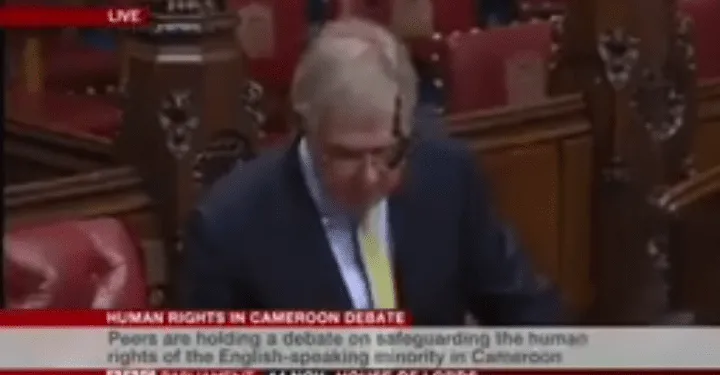Autonomy in a close-net federation will solve Anglophone problem – UK MP
By Tata Mbunwe
During this November session of the United Kingdom’s House of Lords, one of the Members of Parliament, Viscount Waverley, read out an analysis of the Anglophone Crisis, stating that only a return to a Federation could end the conflict.
“Building on lessons learned, autonomy, but not separation, in a close-net federation, is the formula for lasting peace and should be embraced as the solution,” the MP stated in the United Kingdom’s upper house of assembly.
In the assessment document he read, Waverley stated that Cameroon is likely to slip into a “humanitarian disaster” worse than the current one being witnessed in the country’s two English-speaking regions.
“It is terrible and so sad that these wounds have resurfaced. But I fear it was only going to be thus, with the exclusion of the English-speaking minority from the affairs of State.
“The only practical solution is a political settlement with either a United Nations or African Union peacekeeping contagion being placed on the ground to enable an immediate cessation of violence, ensuring a humanitarian protective intervention and a cooling-off period to create the condition to enable an equitable settlement to be hammered up.”
Quoting from documented sources, Viscount Waverley, who was acting as a Crossbencher on the Anglophone Crisis, said Southern Cameroons was restricted in the choice to be independent during the 1961 plebiscite when the State of West Cameroon was only asked to either join the Federal Republic of Nigeria or the Republic of Cameroon.
“At no time before or after its independence from France was Southern Cameroons part of that country known by its French acronym as La Republique du Cameroun.”
Amidst calls by several nations for mediated talks between Government and Anglophone Separatists, the United Kingdom’s Parliament is saying the question of territorial integrity does not supersede Southern Cameroonians’ right to Self-determination.
“A solution would be a close-net federation made up of two entities and thus ensuring no parting of the ways. The question of the legitimacy of territorial integrity superseding that or Self-determination will not be relevant in this instance.”
For 45 years, Britain colonized West Cameroon, the current two English-speaking regions of Cameroon, but the regions later accepted to join the majority French Cameroon in 1961 during a plebiscite.
But after the federal system of government was abolished in 1972, and a unitary system created, the two minority English-speaking regions began complaining against marginalization from the French majority Government.
The quest by lawyers and teachers for the Government to protect the English Education and Judiciary system from French dominance in 2016 plunged the two regions in a conflict that has claimed at least 3,000 lives.



